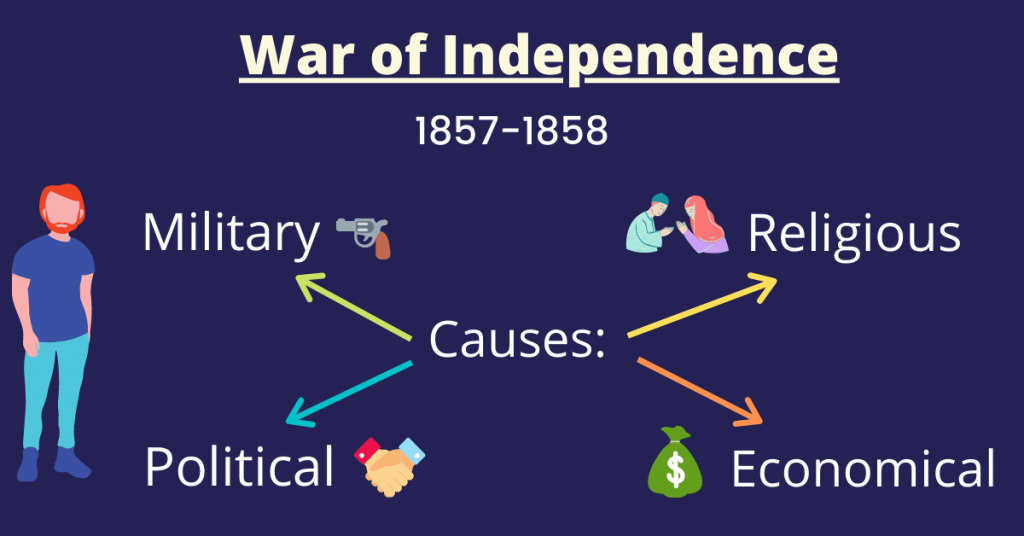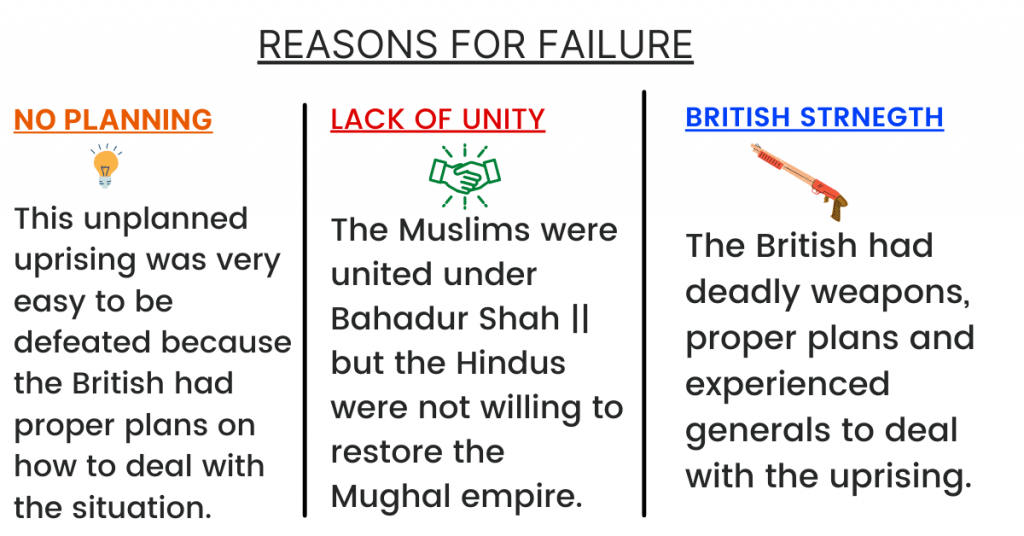The war of independence, also known as the Indian Mutiny or the Sepoy Mutiny, was a rebellion in India against the British rule from 1857 to 1858.
The resentment caused by the British social reforms, high land taxes and the minimum representation of the Indians in the government made them rise against the British to get rid of their domination.
This uprising ultimately failed because the large princely states such as Kashmir, Mysore and Hyderabad along with the smaller princely states did not join the rebellion.
This was all about the introduction of this topic. Now, let’s discuss some causes, events and the reasons for failure for this rebellion of 1857.
War of Independence (1857-1858)
Causes:
There were multiple political, religious, social, military and economical causes for the War of Independence (1857).

In terms of political, the British East India company wanted to annex all the states of India such as Jhansi, Satara, Surat, Ramgarh and Oudh. Therefore, they introduced policies such as the Doctrine of Lapse and Subsidiary alliances.
According to the doctrine of lapse, any princely state under the British East India Company would have its princely status abolished if the ruler had no male heir or was incompetent.
Lord Dalhousie was the Governor-General of India at the time when this system was implemented and he was the one who used this policy extensively. This the reason this policy is associated with him.
This policy was taken as a threat by the ruler of many princely states and the Indians were not ready to accept the systems like this. As a result, they became concerned about the plans of the British.
In a Subsidiary alliance, the rulers were not allowed to negotiate or make a treaty with any other Indian ruler without the investigation of officials of East India Company.
As a result, the British were to protect the state from neighbouring attacks but the ruler was to pay for the maintenance of the force.
If the ruler failed to make the payment, his territory was to be annexed by the Company as a penalty.
This is also known as “Non-Intervention policy” and was introduced by Lord Wellesly, the Governor-General from 1798 to 1805. The Indians were enraged due to these policies and they eventually stood up against the British.
Apart, the British disrespected the Mughals when they shifted the Mughal court and the Muslims were deeply affiliated with the Mughals because they ruled India for years. This action of the British offended the Muslims.
Religious and Social causes:
The people of India were very sensitive about their religion and they were not ready to compromise on their faith.
When they came across the fact that East India Company was spreading Christianity in their land, they became furious and opposed these measures of the British.
The ideology of many British to “westernise” the Indian subcontinent was met with massive criticism and the people Thomas Babington Macaulay introduced the western concepts to the education in India.
Similarly, many Europeans believed that the Indian subcontinent to follow only one religion and ideas like this were objected widely. Specifically, Hindu customs such as Suttee were banned.
In Suttee, the widow was burned on the funeral pyre of her husband in order to show her affection for her. The Governor-General, William Bentinck abolished this practice on December 4, 1829. This measure was taken as an insult by many Hindus.

For the Muslims women, Purda (Hijab) was discouraged and some reports say that multiple mosques were also destroyed by the British which made the Muslims rise in revolt against the British.
Socially, the Indians were considered racially inferior and they were known as “second class citizens” because the Brtish considered them superior.
Further reading:
Khilafat movement | GCE O Level
Population and employment | GCE O level
They believed that it was the duty of the white men to civilize the other communities and dominate them. This ideology created mistrust between the Britsh and the natives.
These religious and social reasons resulted in the First War of Independence of1857.
Military:
The salary of the Indian soldiers in the Brtish army was meagre, and they were denied higher ranks despite their services.
On the other hands, the British soldiers were offered high ranks, posts and fancy salaries and this disproportion, offended the sepoys. Moreover, some Hindus were forced to go overseas despite their will.
The problem with this was that a Hindu cast would lose its cast if they travelled overseas but, the British neglected these facts and adopted a harsh attitude towards the Indian soldiers.
A new rifle was introduced which had fat on it which was to be bitten off by teeth. It was rumoured that it was made of fats of both cow and pig.
In short, loading the rifle often required tearing open the greased cartridge and many sepoys believed that the cartridges were greased with cow and pig fat.
The problem with this was that cow is sacred for the Hindus while the pig is forbidden in Islam. Therefore, many soldiers refused to use this rifle and as a result, the uprising started.
Economical:
The Indians were overburdened with massive taxes and the per capita income at that time was also very low. These measures greatly influenced the tenants who stood against the British.
The elevated status which the Indians enjoyed in the government during the Mughal era was now over and the British denied high ranks in the government.
The industry in the Indian subcontinent was greatly disturbed because the cheap raw materials were exported to Britain where semi-finished and finished products were manufactured.
The British sold these products to make a great profit but the sale of local industry in India declined and Britain was not keen to export its finished products to India.
The economic policies brought massive profit to the British but the locals were adversely affected and their sales, production and overall trade were influenced.

The agricultural sector was also disturbed because the British did not invest in the advancement of agriculture and many fertile lands became unproductive as well.
To summarise, some of the causes of the 1857 War of Independence are:
- The annexation policies disturbed the local Nawabs (rulers).
- The spread of Christianity was not acceptable to Indians (religious).
- The Indian customs such as Suttee were banned (social).
- The salary of Indian soldiers was very low (military).
- Heavy taxation enraged poor tenants (economical).
This takes us to another very important topic which is about the events of the War of Independence.
The Events:
- In January (1857), the Indian soldiers refused to use the new rifle (greased cartridges incident).
On 26 February 1857, the sepoys at Berhampur (West Bengal) also refused to use the new rifle. This started to create disturbances between the Indians and the British.
- In March, the 19th Native Infantry was disbanded and Mangal Pandey refused to obey the British officers. As a result, he was hanged in Barrackpore on 8th April.
- In May, unrest at Ambala erupted.
In Meerut, the Indians soldiers were prisoned when they refused to use the new rifle. They tried to escape from the prison and many British men were killed.
Gradually, this unrest in Meerut intensified and the Europeans start to lose control. The Muslims under Bahadur Shah became unified to get rid of British domination.
- In June, the state of Jhansi was captured by the rebels who handed it over to the Rani of Jhansi (Lakshmi Bai). Tatya Topee (an Indian general) assisted her in Jhansi.
There was Mutiny in Indore as well and with the arrival of Bakht Khan (commander-in-chief of the Indian rebel forces) in Delhi, the British lost control of Delhi as well.
- In Kanpur, the forces of Nana Sahib offered terms to the Europeans who had surrendered and even promised a safe passage.
However, the Europeans were brutally killed by the forces of Nana Sahib and even women and children were not spared. When the British regained control of Kanpur, they carried out even worst atrocities.
- The Europeans started to bribe key figures to regain control of their territories.
They crushed the uprising in Delhi and Allahabad with the help of those Indians who were supporting the British forces. Tatya Topee was betrayed as Jhansi and Kanpur were also regained.
In short, the British managed to crush this rebellion easily due to may reasons. The historians refer to this uprising as a “failed attempt” due to multiple reasons.
So, let’s discuss why the First War of Independence failed?
Reasons for failure:
The weakness of India:
- There was no proper planning.
The lack of planning and the disorganization is one of the main reasons why this uprising was crushed so easily by the British.
Look, the Indians had no plan or strategy to compete with a force that was twice as powerful as them (in terms of weaponry). They did not know how to pressurize their opponents with successive attacks.

This unplanned uprising was very easy to be defeated because the British had proper plans on how to deal with the situation. This planning made them focused and they knew what they were doing.
- The lack of unity weakened the uprising.
The Muslims were united under Bahadur Shah || but the Hindus were not willing to restore the Mughal empire. Therefore, they were unwilling to support the Muslims.
This is the reason why many princely states joined hands with the British and the ruler of Kashmir even dispatched extra forces to assist the British.
If the Indians were united, it would have been almost impossible for the British to defeat them. The people at different places fought for different reasons and even the Sikhs were not ready to support the Muslims.
This is the reason why some historians refer to this rebellion as a Muslim uprising.
- The Indians had no proper arms, ammunitions and experienced commanders to assist them.
The Indians used orthodox weapons against their technologically advanced opponent and this gave them no unusual advantage.
The leader of the Muslims in the War, Bahadur Shah ||, was interested in poetry than in warfare and he was old and incompetent to head the rebel forces.
These were some of the Indian weaknesses that led to the failure of this uprising. In order to understand the topic of Indian weakness, we need to consider British strengths as well.
So, let’s dive straight into the topic.
British strengths:
The Europeans had destructive weapons that were of no match to the weapons possessed by the Indians. They were technologically advanced enough to make deadly weapons.
These trained officers were fully aware of these weapons and they managed to give huge losses to the rebels.
They were very disciplined and followed instructions properly and this attitude helped them to dominate the insurgents. These officers were paid high salaries so that they could not be bribed.
On the other hand, the British commanders bribed key figures which helped them to crush the uprising in many states with ease. The skilled diplomats met the challenge with proper plans, unlike the Indians.
They were very determined to win the war because of their approach towards their enemies and all these factors combined to award the British with a victory.
Aftermath:
This defeat of the Indians strengthened the control of the British over India and their rule prolonged. The Mughal rule came to an end and Bahadur Shah || was imprisoned.
The people who participated in the war against the British were brutally hanged and killed. Moreover, the British denied ranks to the Indians and implemented harsh policies to prevent further uprisings.
The rule of East India Company came to an end and India was taken over by the Queen of England (became a colony). As a result, the corrupt and unlawful activities of the company also ended.
The blame for the entire war was put on the Muslims and the British decided not to cooperate with them. As a result, the Muslims suffered politically, socially and financially.
On the other hand, the Hindus joined hands with the new government, accepted their system and education.

The British passed the Vernacular Act of 1878 to place strict controls on the newspapers that gave birth to nationalist ideas.
To say the least, the 1857 Indian Mutiny changed the history of the Indian subcontinent in many ways because the control of the British even improved and they became even more determined to rule India.
Conclusion:
With this, our topic about the War of Independence of 1857 has come to an end. This was a very important event in the history of the Indian subcontinent.
I hope that all your questions have been answered and your doubts have been addressed properly through this post. The causes, events and the reasons for the failure of this rebellion are the most important topics.
Thank you very much for reading and staying with me till the end and stay tuned for more.
